Marcellus Shale: This Land Is My Land…Or Is It?

Image by toddheft
“I like him.” my friend said, somewhat defensively, referring to the landsman who talked with him about signing a gas lease in the Marcellus Shale. “Well, I like him too,” I shot back, “but remember, he probably won’t be around here next year, and who knows what company you’ll be dealing with down the road…
Waste water, well spacing, fracing chemicals, wildlife habitats, lease assignments – all issues worth sparring about with my friend whose eyes are firmly focused on future fortunes to be made from the Marcellus Shale. Marcellus divides us like no other topic. He, the perpetual pessimist, and I, the eternal optimist, suddenly exchange places when debating this on-coming drill fest.
Consider lease assignments… You’ve carefully researched the gas companies before choosing your best deal, becoming comfortable with your landsman, his company’s history, and its financial situation. Now, you’re just marking time until your company’s rigs arrive. Unfortunately your carefully chosen company may abandon you before the ink is dry on your contract or any time business goals take them elsewhere. These multi-billion dollar gas and oil companies craft new deals often, buying and selling drilling rights as they manage their total portfolios.
Recent deals include XTO Energy’s who announced in April plans to acquire 152,000 net acres in the Appalachian basin from Linn Energy. Similarly, Dominion Resources plans to assign drilling rights on 205,000 Marcellus acres to Antero Resources. In cases like these, landowners signed leases with one company, but now, most without any input or choice, will have new partners who possess the legal power to impact their land usage.
Even the natural life cycle of a gas well could contribute to ownership shifts. The output of a typical well drops drastically after the first couple of years of operation and then gradually lessens over the full life. If the Marcellus Shale follows the path of other gas plays around the country, older wells may become candidates for sale to smaller, less financially stable gas companies.
In a standard lease agreement, the original lease follows the sale. You will be dealing with the new company, with few, if any rights to go after the original company should things go badly – capping of old wells, gas leaks, water issues, etc. Some contracts carry addendums stating that the gas company must notify you if they assign your lease to another company. An addendum declaring that the lease cannot be sold or assigned without your approval may offer a bit more protection.
But no matter how carefully you negotiate the terms of your lease agreement, the reality is sobering: you are no longer sole owner of your land. You are no longer lord or mistress of all you survey. You are no longer in total control of what happens to your little heaven on earth. Your newfound prosperity carries a hefty cost – a dramatic loss of ownership and independence.
Consider this extreme, but possible lease ownership shift. A short Reuters article from Hong Kong appeared on-line in July. “China National Petroleum Corp (CNPC), China’s top state oil firm, is thinking of bidding for minority stakes in shale gas assets of Chesapeake Energy Corp… Chesapeake is looking to raise as much as $5 billion this year from selling minority stakes in its Arkansas and Pennsylvania shale gas properties, the South China Morning Post reported.” Will this happen? I don’t know, but it’s enough to know that it’s possible.
“Well, maybe China National is a good company,” my friend offers. “Yeah, I did some research on it,” I replied, “and it looks like it is, but that’s not the point. We’re already drinking Belgian/Brazilian Budweiser, facing Korean- or Chinese-owned GE appliances, and getting used to the idea of Abu Dhabi owning the Chrysler building. What’s more difficult to imagine is that our neighbors’ private, personal properties could someday belong to China or any other country courted by the gas companies.”
“OK, I can see your point,” my friend said, as the sun slipped from view over the hilltop beyond the valley. As I looked out over the lush, green fields bordered by century-old stone walls, I spied a couple of deer stepping cautiously out from the wood’s edge. I made a mental note to take more pictures over the next few months, capturing on paper this beautiful land as it was before Marcellus awoke.